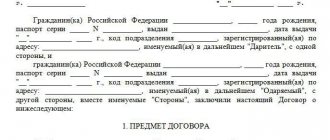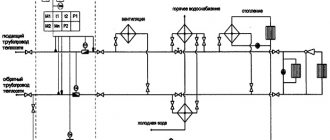The expression “apartment with encumbrances” scares buyers and few people want to deal with such real estate. However, even if restrictions are imposed on housing, this does not mean that it cannot be sold or bought. Let’s figure out what an encumbrance on an apartment is, what it threatens and how it complicates transactions. We'll tell you how to check whether there is an encumbrance on an apartment and how to buy such real estate correctly.
What does it mean - an apartment with an encumbrance?
Encumbrance is a restriction on the performance of certain actions imposed on housing that arose on the basis of law or contract. Some restrictions arise at the will of the owner himself (pledge), while others do not depend on him in any way (seizure).
Article 209 of the Civil Code of the Russian Federation explains that the right of ownership means the ability to:
- Own.
- Use it.
- Manage the object.
Most often, it is the last point that is blocked by the restriction—the ability to manage the apartment. The owner has the right to live in it, in some cases to rent it out, but cannot sell, bequeath or donate the object.
According to Federal Law 122 “On State Registration of Rights to Real Estate,” an encumbrance is a condition that constrains the owner in the use or disposal of his property.
In addition, encumbrance implies that, as a result of some situation or transaction, third parties receive certain rights to the object. For example, a bank becomes the mortgagee of an apartment when purchasing it with a mortgage. In such a situation, the owner of the property cannot perform certain actions with it without the approval of the bank.
Types of encumbrance
To resolve the current situation of restriction of rights, it is necessary to understand its essence . You need to know what an apartment with a certain type of encumbrance means, how it will influence the course of action of the owner-seller and the found buyer.
, the following types of encumbrances are distinguished :
Mortgage
It involves receiving finance for the temporary (until the debt is repaid) transfer of part of the rights to real estate to a credit institution .
Since the owner received the money, he must provide the organization with a strong guarantee of its return. That is why until the funds are returned and the contract is closed .
Rent
Buying a property with tenants is an unpleasant experience. Therefore, the owner should not carry out the operation until the residents have been evicted and the living space has been completely vacated.
The problem is the duration of the agreement between the owner and the guests ; it can be about a year at the time of sale of the apartment. Then the eviction procedure will require judicial intervention.
Rent
Providing the owner with everything necessary throughout his life or for a certain period of time allows him to obtain ownership of his apartment. For this reason, the sale of an apartment that is to be transferred to a new owner in the future should be excluded .
If the current owner changes his mind about transferring the property or no longer needs the help of the second party, it is necessary to terminate the contract . You will also need to return previously received finances and recalculate money issued for the purchase of essential items, food or medicine.
Read more about what a lifetime apartment rental is here.
Arrest
This encumbrance is the most complex . The need for a lien may be caused by a lack of sufficient payment of bills and services. In this case, restrictions will be applied by government services and no outside organizations will be able to influence the decision made .
A special case is not just the limitation of operations and their prohibition, but also the inability of the owner to live in a personal apartment.
Trust management
The option with trust management involves the supervision of the property of an outsider. The contract is drawn up for a certain period, therefore the rights are partially transferred to the temporary owner .
For example, when traveling abroad, owners want their property to be monitored and incoming bills to be paid on time. The assigned right of disposal can be withdrawn ahead of schedule only upon the death of the executor or by agreement of both parties .
What are the encumbrances?
There are 9 types of encumbrance:
- Mortgage.
- Arrest.
- Rent.
- Trust management.
- Easement.
- Rent.
- Guardianship (maternity capital).
- Registration of a minor child.
- Permission of the second spouse.
Let's look at each of them in more detail.
Mortgage
Mortgage, as a type of encumbrance, is the most common. When purchasing a home using a mortgage loan, the apartment is pledged until it is paid in full. You can sell such property at any time, but not every buyer will want to deal with such a process.
Arrest
An arrest occurs in the event of disputes regarding an apartment. It can be imposed by the courts, bailiffs and police. This is one of the most difficult restrictions. It is imposed if it is necessary to attract the owner to fulfill certain obligations: payment of debts on utility bills, loans, alimony, etc.
Rent
Rent is a common encumbrance in Russia. The home owner signs an obligation to transfer ownership of his apartment to another person. In exchange, he demands that he be provided with lifelong care. Nothing can be done with such real estate. The restriction is lifted only after the death of the current owner. From this moment on, the rights to the apartment pass to the person who cared for the owner.
Trust management
Trust management is the transfer of rights to manage real estate to a trustee. This type of encumbrance is rarely used, and only if the owner for some reason cannot personally monitor his property.
Easement
An easement is the right of one person to use the property of another. For example, an apartment is divided between two owners in equal shares, but one of the rooms is a walk-through room. This means that the one to whom it does not belong will still, at a minimum, pass through this room.
Rent
Rent does not interfere with the sale of property. But there is one thing: the new owner will not be able to evict the tenants until the end of the lease agreement. The difficulty is that sometimes such agreements are concluded for a long period, or even indefinitely.
Guardianship and maternity capital
Guardianship is a burden that is placed on an apartment purchased using maternity capital. In this case, not only the parents, but also the children become the owners of the apartment. This means that it is impossible to sell such an apartment without permission from the guardianship authorities.
Registered minors
If a child under the age of 18 is registered in the apartment, this imposes restrictions on actions on such real estate. A child can be discharged only with the consent of the guardianship authorities and both parents.
Consent of the second spouse
If the apartment was purchased during marriage, it is joint property and one spouse will not be able to sell it without the notarized consent of the other.
Required documents
Please note! When registering the sale of an apartment that has certain encumbrances, you will need to provide:
- a contract for the purchase and sale of real estate, in which a separate clause will indicate the presence of an encumbrance,
- apartment acceptance certificate,
- title document for ownership of residential premises,
- an extract from the Unified State Register indicating the established encumbrances,
- written statements from the buyer and seller, which reflect information that the parties to the transaction have been notified of the existence of an encumbrance on the apartment,
- an extract from the house register about everyone who is registered in this apartment,
- bank receipt for payment of state duty,
- passports of the seller and buyer. If either or both of them are represented by authorized representatives, documents of representatives and powers of attorney are attached that confirm their authority.
This is an incomplete list of documents that are required to complete a transaction. In each specific case, it may be necessary to have other official papers, which are determined by the characteristics of the established encumbrance.
For example:
- encumbrance with a mortgage will require the written consent of the mortgagee,
- encumbrance with rent - consent of the recipient of payments, formalized by a notary,
- judicial arrest will require a court decision to cancel it or a corresponding order of the bailiff,
- the sale of an apartment that belongs in whole or in part to a minor is possible only with the consent of the guardianship and trusteeship authority,
- Alienation of a jointly owned apartment without the consent of the second spouse is impossible.
If the apartment is in trust management, you must provide a copy and original of the trust management agreement.
What risks may arise?
The presence of restrictions on real estate can be a big problem for new owners. To avoid complications, you must carefully check the documents before signing a housing purchase agreement. Of course, there is one significant advantage in purchasing such a distressed apartment - the price is below market value. But does the low price cover the existing risks?
Expert opinion
Alexander Nikolaevich Grigoriev
Mortgage expert with 10 years of experience. He is the head of the mortgage department in a large bank, with more than 500 successfully approved mortgage loans.
An already signed purchase and sale agreement may be terminated, and it will be difficult to return the funds spent. In such situations, you have to go to court, where you need to prove that the deal fell through because of the seller. These are additional costs, time and nerves. Even if the court decides in favor of the new owner, no one can guarantee that the seller will in good faith compensate for the damage suffered by the buyer.
How to check if there is an encumbrance on an apartment - 7 ways
There are several ways to find out whether any encumbrance has been imposed on the apartment:
- Online request on the Rosreestr website . To do this, you need to go to the website and find the “Reference information on real estate online” service. Next, fill in the required fields with information about the apartment. The check takes 1-2 minutes. Rosreestr will issue a report with the information it has: full address, full name of the owner, type of property and the presence of restrictions. This is a simple, fast, free, but not very reliable method. Unfortunately, the information here is not updated frequently.
- Extract from the Unified State Register of Real Estate . It can also be ordered online on the Rosreestr website, but it contains more information. Please note that the statement is valid for only 30 days. The future buyer must be prepared to pay a fee for this service. Today it is 250 rubles.
- Extract from other online services . You can check whether there is an encumbrance on the apartment not only on the Rosreestr website, but also in other online sources. The algorithm of actions here is similar to Rosreestr: we go to the website, fill out the form with the address and receive the necessary information.
- Data from the house register or apartment card . There will definitely not be information about mortgages here, but you can find out information about registered minor children.
- Realtor services . This option is suitable for those who do not want to delve into the process of purchasing and decorating an apartment. For money, realtors will find information about restrictions. In this case, they will use exactly the methods that were indicated above.
- Contact the architecture department . Here you can get additional information about whether this apartment is on the list of emergency housing. Purchase and sale transactions with such real estate are prohibited by law.
- Through bailiffs . You can check the presence of encumbrances on the part of bailiffs at the territorial office of the FSSP or on their website. The appeal can be either oral or written.
How to place an encumbrance on real estate?
The owner of the property has the right to impose a ban on registration of his apartment. This is done in order to exclude fraudulent actions on the part of tenants or relatives who have access to housing documents.
To impose an encumbrance, you must contact Rosreestr and submit the following papers:
- Ownership documents.
- A certificate of opening an inheritance case or a lease agreement.
- Cadastral passport.
- Homeowner's documents - passport, marriage/divorce certificate.
- If the restriction will affect the rights of third parties, it is necessary to attach their notarized consent (for objects with shared ownership or jointly acquired property).
You can register an encumbrance through the MFC. To do this, you need to transfer or send by registered mail the required package of documents. Contacting the MFC will slow down the process of imposing a burden. You can speed it up by visiting Rosreestr in person.
What are the dangers of buying housing with encumbrances?
Despite the presence of an encumbrance, the homeowner can put the apartment up for sale. Such offers are found on the real estate market, and the main danger of purchasing such an object is not the presence of an encumbrance, but the owner’s desire to hide this fact. It’s one thing when the sale announcement indicates the fact of encumbrance and the price is reduced, but another thing is when the owner hides the existence of a lien or lien and sells the property at market value.
When purchasing an apartment, in any case, it is necessary to conduct a full check of the information provided by the owners. This also applies to information about the number of owners, the basis for acquiring ownership rights, and the presence of encumbrances. You can check this data by ordering an extract from Rosreestr. You can receive an extract from the Unified State Register with up-to-date and reliable information quickly and without visiting the MFC by using our service Unified State Register-online.rf. The extract is provided on our service only in electronic form directly from Rosresstra (when filling out the form on our website). If necessary, you can order an extract with a digital signature; the document has the same legal force as a paper extract.
How to sell an apartment with an encumbrance
The sale of an apartment with an encumbrance is quite possible on legitimate grounds, subject to obtaining permission from the mortgagee or other entities whose rights are affected by the encumbrance. Along with the right to own the apartment, the buyer of such a property is also given an encumbrance (for example, a mortgage loan or the need to pay a certain amount under a life-long annuity agreement). The benefit for the buyer in this case is an attractive price: such apartments, as a rule, cost 30-50% less than properties without encumbrances. That is why many agree to purchase such housing if the conditions are truly favorable.
The most common case of selling housing with an encumbrance is a contract for the sale and purchase of an apartment pledged by a bank (for example, a mortgage loan secured by an apartment). To carry out a transaction, the owner must obtain permission from a financial institution. In this case, the agreement must reflect the terms of repayment by the new owner of the loan. The buyer receives an apartment with an encumbrance, which will be removed subject to full repayment of the loan debt.
More serious risks are associated with a real estate transaction under which a lifetime annuity agreement was concluded (an agreement under which the annuity recipient transfers ownership of his apartment to the annuity payer in exchange for certain regular payments for life). In this case, only the written consent of the annuity recipient will be required. However, in such a transaction, it is important to carefully read the subject of the agreement and its terms.
Another complex case that requires serious analysis is the purchase of an apartment in which, in addition to the owner, other persons are registered, and these may be minors or incapacitated. Such persons are protected by law; it will not be possible to discharge them from the apartment without the consent of the guardianship authorities. Former spouses with whom housing was purchased, or other relatives applying for housing, will also most likely have to be discharged through the court. They are unlikely to want to be discharged of their own free will.
How to remove restrictions on real estate ownership
Removal of restrictions on ownership in the case of a mortgage loan occurs after full repayment of the debt. To remove the encumbrance, you must contact a government agency (MFC or Rosreestr branch) and provide the following documents:
- a written application from the mortgagee (financial organization);
- application from the mortgagor (owner of the apartment);
- a document for receiving a monetary obligation with a note indicating the payment of the debt.
In the case of a life annuity agreement, the removal of ownership restrictions occurs upon the death of the annuitant.
Is it possible to rent out living space with an encumbrance?
An encumbrance is not a basis for a ban on renting out an apartment. Restrictions relate only to the sale or gift of real estate. In this case, the owner can use the apartment at his own discretion, live in it himself or rent it out to others to generate income. In some cases, the permission of the mortgagee (bank) may be required if the corresponding clause is specified in the agreement.
How to check for an encumbrance
You should not trust the information provided by the seller (the owner of the property). Moreover, anyone can check this information. Data on the presence of an encumbrance is recorded in Rosreestr and is reflected in an extract from the register (in section 4). The information is public, and anyone can order an extract from the Unified State Register of Real Estate for a fee in order to check all the necessary information about the apartment.
An extract can be ordered at the MFC (to do this you need to come to one of the branches and submit an application) or on the official website of Rosreestr. Preparation of a document at a government agency takes about 5 days. You can also order an original extract (an electronic document with a digital seal of Rosreestr) on our website egrp-online.rf. The extract is prepared within a few minutes; you just need to fill out a special form on the website. The document contains the most complete and up-to-date information.
How to remove the encumbrance?
Rent. The rent restriction can only be removed after the death of the previous owner. Very often, our citizens neglect to document the removal of the encumbrance, believing that the housing is already their property. Such frivolity can negatively affect the sale of an apartment or the registration of a mortgage on it. Sometimes the bank refuses to issue a loan, considering untimely lifting of the restriction a sign of unreliability.
Expert opinion
Alexander Nikolaevich Grigoriev
Mortgage expert with 10 years of experience. He is the head of the mortgage department in a large bank, with more than 500 successfully approved mortgage loans.
Withdrawal is quite simple and does not require much time. To do this, a corresponding application, a rental agreement and a death certificate of the previous owner are submitted to Rosreestr. After checking the documents, the restriction will be lifted and the apartment will become the full property of the new owner.
Mortgage. When submitting an application to remove the encumbrance, the presence of all home owners (and sometimes representatives of the bank) is required. To do this, you need to come to Rosreestr or MFC with a full package of documents. After submitting the application, the restriction will be lifted within 5-10 days. If necessary, the apartment owner will be given a clean extract from the Unified State Register of Real Estate without restrictions.
Required documents to lift restrictions
The list of documents for removing the encumbrance can be large.
It always consists of 2 categories of papers:
- Basic. Owner's application, passport, title documents, receipt of payment of state duty.
- Additional. Depends on the form of the encumbrance.
It is very important to carefully consider not only the list of documents, but also the correctness of their completion. After all, even the smallest errors and inaccuracies can lead to a refusal to lift restrictions.
The application shall indicate:
- Personal information about the applicant - full name, date of birth, passport details and residential address.
- Information about the encumbrance - type, terms, grounds, etc.
- List of papers attached to the application - a copy of the passport, title document, etc.
The list of additional documents will depend on the type of restriction imposed.
Upon arrest, depending on its grounds:
- A receipt from the housing and communal services confirming that the owner no longer has debts.
- A document from the bailiff who imposed the arrest on the fulfillment of the requirements.
- A police certificate indicating that the damage has been fully compensated.
One of these papers is attached to the application and sent to the court for consideration. The arrest can only be lifted after a court order has been issued. This resolution is submitted to Rosreestr to remove the encumbrance.
For a mortgage:
- Certificate of repayment of mortgage from the bank.
- Loan agreement.
- Statutory documents of a financial institution.
- Mortgage on an apartment.
When renting, depending on the reasons for termination of the contract:
- A court decision to terminate the lease agreement due to failure to fulfill the obligation of one of the parties.
- A court decision declaring an existing lease agreement invalid or void.
- Other paper confirming the termination or termination of the lease agreement (death certificate of the tenant, for example).
Expert opinion
Alexander Nikolaevich Grigoriev
Mortgage expert with 10 years of experience. He is the head of the mortgage department in a large bank, with more than 500 successfully approved mortgage loans.
With an annuity, the situation is quite complicated, because the law allows such an encumbrance to be removed only in the event of the death of the legal owner. But there is an exception to this rule - the presence of a court decision declaring the annuity agreement void due to the limited or complete incapacity of one of the parties. To remove the encumbrance in the general manner, you will need to attach a death certificate of the previous owner to the main above-mentioned documents.
In case of trust management:
- Death certificate of the person who served as the trustee.
- An agreement signed by both parties to terminate the trust management agreement.
- A court decision declaring the agreement invalid or void.
Scheme for buying/selling an apartment with an encumbrance
Purchasing an apartment with an encumbrance must be carried out according to the following procedure:
- Receive and carefully study the extract from the Unified State Register of Real Estate. If the property often changed its owners, check why. If there is a serious redevelopment, find out if it is legal.
- Check the seller. Find out whether he is legally competent and whether he is registered with a psychoneurological or drug treatment clinic. Check the documentation he has for the apartment.
- Check the certificate confirming the absence of registered persons in this living space.
- Find out if there are debts for utility services.
- If there is a restriction, act depending on the type of encumbrance.
With a mortgage, there are 2 ways to sell real estate:
- The buyer renegotiates the mortgage agreement in his or her name and continues to make regular payments to the bank. The restriction is lifted after the entire loan amount has been repaid.
- The seller, having received funds from the buyer, fully repays the mortgage debt. Thus, the encumbrance on the apartment is immediately removed.
Maternal capital. The sale of an apartment purchased using maternity capital is possible only with the permission of the guardianship authorities or after the children reach the age of majority.
Arrest. When selling an apartment with a restriction in the form of arrest for non-payment of utility bills, you can either pay off the debt before entering into the transaction, or negotiate with the buyer to reduce the cost of the apartment by the amount of the debt.
Expert opinion
Alexander Nikolaevich Grigoriev
Mortgage expert with 10 years of experience. He is the head of the mortgage department in a large bank, with more than 500 successfully approved mortgage loans.
If the owner wants to sell an apartment where minor children are registered, he must first obtain permission from the guardianship authorities. Parents must provide documents confirming that the child will have other housing that is not inferior to the original one. Without these papers, the sale of the apartment will not take place.
Is it possible to sell an encumbered apartment?
As legal practice shows, it is possible to sell an apartment with encumbrances.
However, this does not apply to all types of encumbrances:
- Thus, an apartment with a seizure cannot be sold,
- With a mortgage, alienation is possible, however, on the condition that the obligations of the borrower are transferred to the new owner.
Recently, selling an apartment with encumbrances or other restrictions has become common practice. The main condition is that the buyer must be aware of the existing problems and understand that his property rights will be limited until the encumbrance is lifted.
Consultation with a real estate lawyer is free around the clock.
For example:
- The owner of the apartment did not fully repay the mortgage. The apartment is sold at a reduced price along with loan obligations,
- The apartment was sold in installments. Until the full amount is repaid, the property remains with the seller,
- The apartment is rented under a long-term contract. When concluding a transaction for the purchase and sale of such housing, the rights of the lessor are transferred to the new owner. And until the expiration of the lease agreement, the new owner cannot use the purchased housing,
- the apartment is burdened with rent. Its alienation will require not only the decision of the owner, but also the consent of the rent recipient. Upon receipt, the transaction is possible. In this case, the obligations under the rental agreement are transferred to the new owner.
Current legislation requires that when alienating an apartment with an encumbrance, this should be indicated in a separate clause of the contract. And if this concerns a mortgaged apartment, then a mortgage lending agreement is concluded with the new owner.
FAQ
Let's consider the most common questions that relate to apartments under encumbrance.
Is it possible to register in an apartment with an encumbrance?
It is impossible to answer this question unequivocally. The answer to this will depend on the type of constraint. Thus, all persons included in the purchase and sale agreement can register in a mortgaged apartment. But the bank may prohibit the registration of close relatives.
It is impossible to register in a seized apartment until the owner resolves all financial and legal issues.
In housing that has been rented out, the owner can register whoever he wants. However, he will be able to exercise the right to dispose of the property only after the end of the lease agreement.
Registration in an apartment with rent is possible only with the permission of the other party.
Is it possible to sell an apartment with an encumbrance?
Selling an apartment with an encumbrance is an absolutely legal transaction in most cases. The nuance of this operation is that a full transfer of ownership of housing is possible only with the consent of third parties.
Expert opinion
Alexander Nikolaevich Grigoriev
Mortgage expert with 10 years of experience. He is the head of the mortgage department in a large bank, with more than 500 successfully approved mortgage loans.
As a general rule, the sale of an apartment with a restriction must be agreed upon not only between the direct participants in the transaction, but also with a third interested party - a bank, government agencies, rent recipient, etc.
Is it possible to rent out an apartment with an encumbrance?
If we talk about mortgages, the law does not prohibit renting out such housing. Whether the bank will allow this is an open question. Everything here will depend on the contract. If there is a ban there, it’s not worth the risk, because violating the terms of the contract can become a big problem. Another option is to include permission to rent out an apartment in the agreement with the bank.
Expert opinion
Nikolay Shpedt
I run a real estate agency. I have extensive sales experience, helping clients obtain mortgages.
As for the seizure, Article 51 of the Federal Law “On Enforcement Proceedings” states that the debtor cannot carry out any actions with the seized property. Accordingly, it is impossible to rent out an apartment that has been seized.
conclusions
Most encumbrances are not an obstacle to buying or selling an apartment. However, a negative attitude towards them leads to the fact that such housing is sold at a good discount. Therefore, you can buy such real estate for several hundred thousand rubles cheaper.
To minimize risks:
- Carefully check the documents the seller has.
- Order certificates and extracts (USRN, bailiffs, architecture department, etc.).
- Find out the type of encumbrance.
If it comes to a harmless encumbrance in the form of a mortgage, you should not be afraid of such property. You need to be wary of real estate encumbered with rent or seizure. It is almost impossible to rent it, so it is not worth buying such housing.
Collection of data about the apartment
Many people think about whether it is worth purchasing housing with an encumbrance. This is a completely reasonable question, the answer to which depends on what types of restrictions are imposed on the property. Based on this, you can calculate the complexity and likelihood of removing them and the possible risks of purchasing such an apartment. Having complete information about the property, you can comprehensively assess the situation and make the right and informed decision.
The source of such information may be:
- Realtors with experience. As a rule, real estate agency staff have access to almost all databases. For a reasonable fee, a specialist will provide the customer with a complete picture of the entire history of the object of interest in a short time. At the same time, a knowledgeable realtor will be able to comment on the feasibility and risks of buying an apartment.
- Tax police. In this body you can find out whether the property is rented or in responsible use. This issue needs to be clarified immediately before purchasing a home with an encumbrance so that the information does not become outdated.
- Territorial division of Rosreestr. This organization records all cases of imposition of bans on the use of property. After paying the fee and filling out a request, you can receive a detailed statement about the presence or absence of restrictions.
- House management company. We are talking about a house book, from which you can find out about all registered residents. In addition, you immediately need to clarify the presence of debts for utilities.
- Architecture Department. By making a request to this structure, you can find out about the degree of deterioration of the structure. If it is close to emergency, then purchasing an apartment with such an encumbrance will be impossible.
But the presence of prohibitions and restrictions is not at all a reason to refuse to purchase real estate. The problems can be easily resolved, and the stated price is very attractive. In addition, it is the restrictions that can be used as a trump card during negotiations and bidding with buyers.









